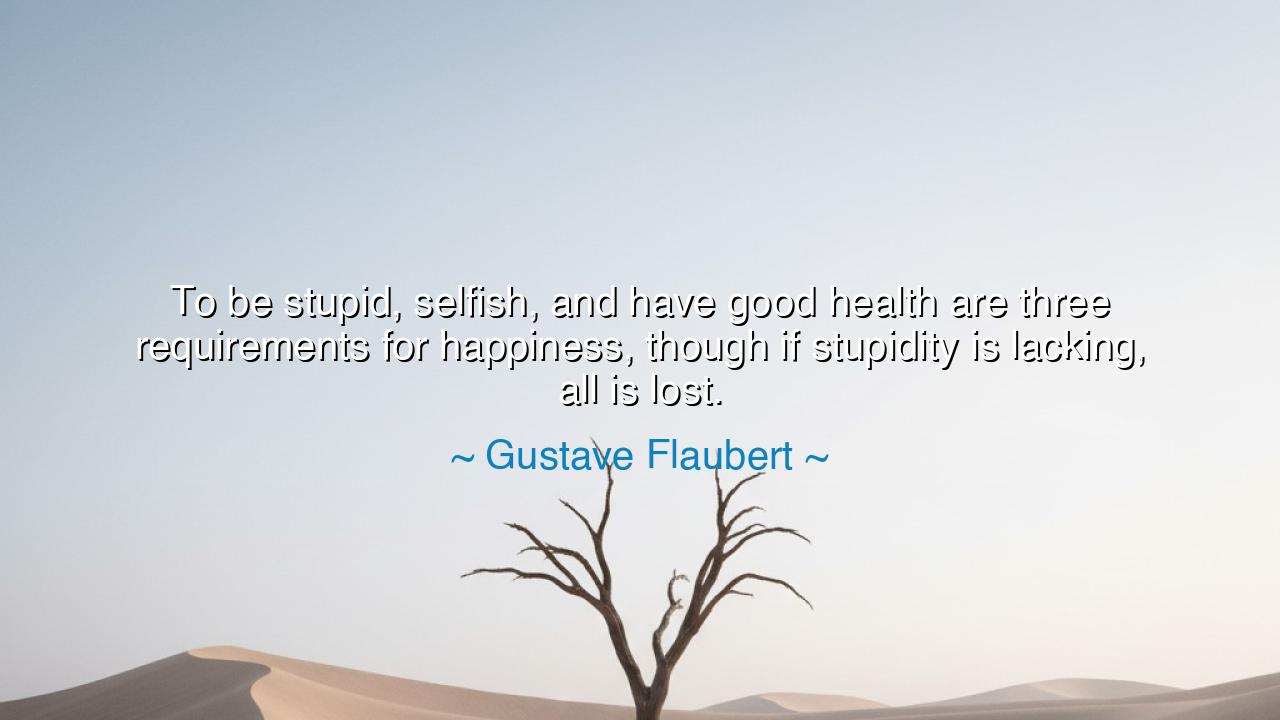
To be stupid, selfish, and have good health are three
To be stupid, selfish, and have good health are three requirements for happiness, though if stupidity is lacking, all is lost.






In the piercing and ironic words of Gustave Flaubert, master of observation and mirror of human folly, we hear a truth both unsettling and profound: “To be stupid, selfish, and have good health are three requirements for happiness, though if stupidity is lacking, all is lost.” At first, these words may strike the ear as cruel or cynical — a jest aimed at humanity’s simplicity. But beneath the surface lies a deeper reflection on the nature of contentment, and the tragic tension between wisdom and peace of mind. Flaubert, who watched the world with both love and weariness, knew that knowledge brings not only light, but burden. To live too consciously is to see too much, and in seeing too much, to suffer.
To the ancients, the philosopher was both the most awake and the most tormented of men. Socrates declared that “the unexamined life is not worth living,” but in that examination he found endless disquiet. The ignorant man, meanwhile, moved through life untroubled, untouched by the weight of meaning or consequence. And so, Flaubert’s “stupidity” — though spoken with biting wit — may be seen as a kind of blissful unawareness, a freedom from the chains of overthinking and moral anguish. The one who questions everything finds no rest; the one who accepts what is, however flawed, sleeps peacefully. Thus, stupidity in this sense is not idiocy, but innocence — a shield against the torment of excessive understanding.
The second element of Flaubert’s triad, selfishness, may at first seem a vice unworthy of happiness. Yet Flaubert, ever the observer of human nature, saw that the world often rewards the self-centered far more readily than the selfless. To live for others is noble — but it is also to carry their pain, to sacrifice one’s peace for their comfort. The selfish, in their narrow gaze, protect their tranquility; they take without guilt, act without hesitation, and thus, paradoxically, live without torment. The selfless, by contrast, are burdened by empathy — their hearts wide open, their minds ever troubled by the world’s injustices. Flaubert’s irony reveals a cruel truth: that in a world ruled by appetite and ambition, virtue often leads to suffering, while self-interest leads to ease.
Then comes the final requirement — good health — the most obvious and yet the most essential. For even the simplest pleasures of life lose their sweetness when the body fails. The ancients called health the first wealth, for without it, the mind cannot soar nor the heart rejoice. The one who is healthy possesses the foundation upon which all other joys rest. Even the “stupid” and “selfish” — if robust in body — find happiness easily, for their days are not shadowed by pain. Flaubert’s irony turns here toward tragedy: that so many who have brilliance and goodness lack only health, and in that lack, lose their chance at peace.
History abounds with examples that illuminate this paradox. Vincent van Gogh, the visionary painter, possessed genius beyond measure and a heart of boundless empathy. Yet his wisdom became his torment — he saw beauty in everything, and pain in that beauty. His health faltered, his mind betrayed him, and though the world now calls him immortal, he lived in anguish. Contrast him with the content peasant of his village — unlearned, untroubled, and poor in means but rich in simple happiness. Flaubert would point to these two lives and say: the gods are unjust, but the world remains true to its irony.
And yet, we must not mistake Flaubert’s words as praise for ignorance. Rather, they are a warning — a lament for how modern life often punishes those who think too deeply or feel too strongly. The wise see through the illusions that comfort the masses, and thus live burdened by clarity. The fool, in his blindness, walks lightly. But between these two extremes lies the path of the philosopher — to know much, yet not be consumed by it; to see truth, yet still cherish joy; to think deeply, yet laugh often.
So let this be the lesson to those who hear: do not seek stupidity, but seek simplicity. Learn to rest your mind from its endless labor. Do not despise selfishness, but learn self-preservation — for one cannot serve others when one’s own spirit is broken. And guard your health, body and soul alike, as the temple through which life itself is known. For though Flaubert’s words sting with irony, they conceal an ancient wisdom: happiness does not bloom in the cluttered mind, but in the balanced heart — where thought, care, and vitality live in harmony.
Thus, remember the spirit of his jest: “If stupidity is lacking, all is lost.” Perhaps it is not stupidity he truly means, but the art of not thinking too much — the grace of laughter, the mercy of forgetfulness, the wisdom to live lightly. For to live wisely and happily is to see all, forgive much, and yet still smile at the simple joys that the world offers to those humble enough to receive them.






AAdministratorAdministrator
Welcome, honored guests. Please leave a comment, we will respond soon